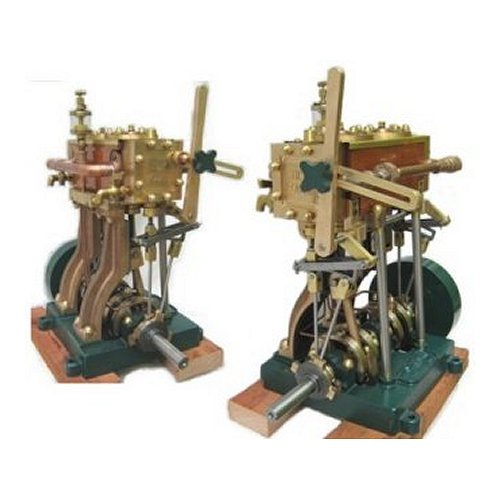I would be really interested in knowing more about your steam engines. Steam power is a long time interest of mine that I've never figured out how to jump into.
While I always found steam engines very interesting I never thought I would attempt to acquire and use my own. It was only after I decided that I wanted to be able to jump from the stone age (the result of an EMP) to the steam era and found a coal seam on The Ridge, did I investigated them more.
I did a lot of searching to find steam engines that would fit my budget and not be so high tech that I could not maintain fix and duplicate myself. What I eventually settled on is casting sold by
Tiny Power see here. Since my milling machine and lather are on the small side (fit my budget) I decided to go with the W class engine...
that is capable of 2 HP. That is large enough to run all of my equipment in my shop save the air compressor (requires 5 HP).
I purchased one set of casting and just started to teach myself to machine the parts and got far enough to know that it was worth purchasing more casting sets as insurance in the event of an EMP. I also paid them to machine one set for me so that I could use it as a guide. I learned some good short-cuts from that that will make the machining easier. This is it running off of shop air.
I have been busy with my restoring an old home project so The Princess has not given her approval to do more with it. But it is a "carrot" that keeps me motivated to finish the remodel work so I can get back to working with it.
I also purchased a set of drawings for the boiler which will require me to learn how be more than a hack welder.
The other tid-bit I can add is I learned that there is such a thing as steam oil that works like air tool oil but has a higher viscosity and a special oiler. That is still on my list along with figuring out how I will build a regulator because the engine I purchased is intended to be used in a boat where there will always be a load. When used in a shop to power tools via belts and Line Shafts, a broken belt could result in a run-away engine that is "bad bad bad".
If you are interested in learning more than I can share
check out David Richards on YouTube. He has a steam powered machine shop and some of videos touch on the steam engine, boiler inspection,
upkeep, water chemistry etc. At one point he used a small engine to restore a larger engine that now runs his shop. Check him out!
That is all I can offer. Steam engines are my goal, not my capability.
Ben


















































